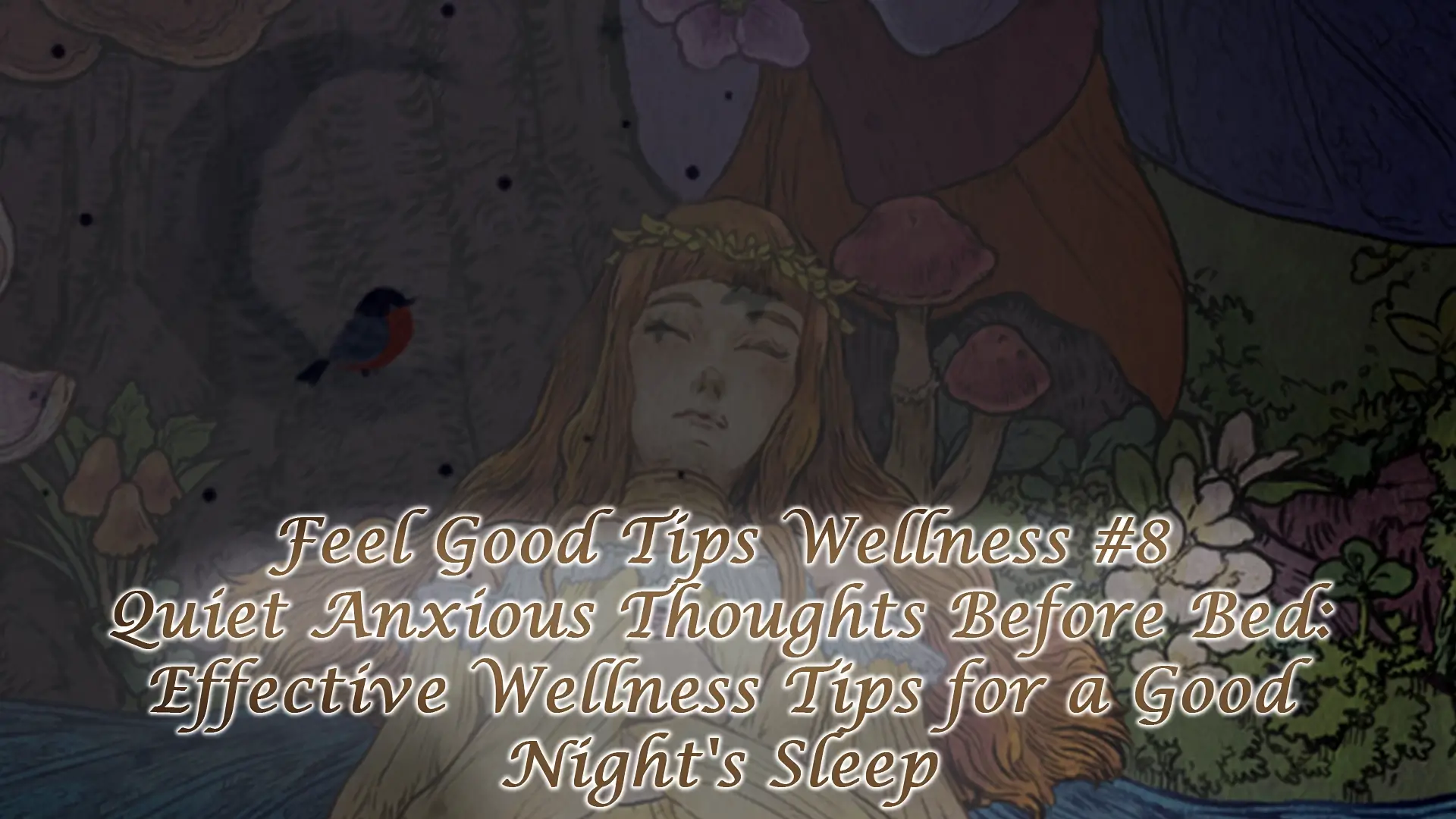Quiet Anxious Thoughts Before Bed: Effective Wellness Tips for a Good Night’s Sleep
In today’s fast-paced world, finding moments of tranquility can be challenging, especially when it comes to quieting anxious thoughts before bed. The daily stresses and pressures can often linger, making it difficult to unwind and prepare for a restful night’s sleep. However, incorporating simple yet effective wellness practices into your bedtime routine can help alleviate anxiety and promote relaxation. Here are some feel-good tips to help you quiet anxious thoughts before bed:
Mindful Breathing Exercises
One of the most powerful tools for calming the mind is mindful breathing. Take a few minutes before bed to focus on your breath, inhaling deeply through your nose and exhaling slowly through your mouth. Notice the sensation of the air entering and leaving your body, and allow your breath to anchor you in the present moment. This simple practice can help quiet anxious thoughts and induce a sense of calm.
Journaling
Writing down your thoughts and feelings before bed can be incredibly therapeutic. Spend a few minutes jotting down anything that’s on your mind, whether it’s worries, fears, or even gratitude for the day’s blessings. By externalizing your thoughts onto paper, you can release them from your mind and create space for relaxation and peace.
Progressive Muscle Relaxation
Progressive muscle relaxation is a relaxation technique that involves tensing and then relaxing each muscle group in the body. Start by tensing the muscles in your feet and gradually work your way up to your head, paying attention to any areas of tension or discomfort. By systematically relaxing each muscle group, you can release physical tension and quiet anxious thoughts.
Create a Relaxing Bedtime Routine
Establishing a soothing bedtime routine can signal to your body that it’s time to wind down and prepare for sleep. This could include activities such as taking a warm bath, reading a book, or practicing gentle yoga stretches. Find activities that help you relax and incorporate them into your nightly routine for optimal results.

Limit Screen Time
In today’s digital age, it’s all too easy to spend the hours before bed scrolling through social media or watching television. However, the blue light emitted by screens can interfere with your body’s natural sleep-wake cycle and exacerbate feelings of anxiety. Try to limit screen time in the evenings and opt for more calming activities instead.
Practice Gratitude
Cultivating a sense of gratitude can shift your focus from worries and anxieties to the positive aspects of your life. Before bed, take a moment to reflect on the things you’re grateful for, whether it’s your health, relationships, or simple pleasures like a warm cup of tea. By shifting your perspective, you can quiet anxious thoughts and promote a sense of contentment.
Guided Imagery
Guided imagery is a relaxation technique that involves visualizing peaceful and calming scenes. Close your eyes and imagine yourself in a serene setting, such as a tranquil beach or a lush forest. Focus on the sights, sounds, and sensations of this imaginary place, allowing yourself to fully immerse in the experience. Guided imagery can help distract your mind from anxious thoughts and promote relaxation.
Limit Caffeine and Alcohol
Both caffeine and alcohol can disrupt sleep patterns and contribute to feelings of anxiety. Limit your intake of caffeinated beverages like coffee and tea, especially in the hours leading up to bedtime. Similarly, avoid alcohol close to bedtime, as it can interfere with the quality of your sleep and leave you feeling restless and anxious.
Practice Self-Compassion
Be gentle with yourself, especially when you’re feeling anxious or overwhelmed. Instead of criticizing yourself for feeling anxious, practice self-compassion and remind yourself that it’s okay to feel the way you do. Treat yourself with kindness and understanding, and remember that tomorrow is a new day with new opportunities.
Seek Professional Help if Needed
If anxious thoughts consistently interfere with your ability to sleep or function during the day, don’t hesitate to seek professional help. A therapist or counselor can provide support and guidance to help you manage your anxiety and develop coping strategies. Remember, you don’t have to face your struggles alone.
And so
Incorporating these feel-good tips into your bedtime routine can help you quiet anxious thoughts and promote a sense of calm and relaxation. By taking proactive steps to prioritize your wellness, you can enjoy a restful night’s sleep and wake up feeling refreshed and rejuvenated each morning. Remember to be patient and consistent with your efforts, and don’t hesitate to seek support if you need it. Sweet dreams!
More Tips
Feel Good Tips Wellness #1 – Thought Stopping Techniques
Feel Good Tips Wellness #2 – Body Scanning Technique
Feel Good Tips Wellness #3 – Power of Aromatherapy for Positivity
Feel Good Tips Wellness #4 – Behavioral Activation
Feel Good Tips Wellness #5 – Anger Release Techniques
Feel Good Tips Wellness #6 – Expressive Writing Techniques
Feel Good Tips Wellness #7 – End of Day Reflection Questions
Feel Good Tips Wellness #8 – Quiet Anxious Thoughts Before Bed
Feel Good Tips Wellness #9 – Belly Breathing vs Diaphragmatic Breathing
Feel Good Tips Wellness #10 – Yoga Stretches for Your Body & Mind
Feel Good Tips Wellness #11 – One Minute Mindfulness Exercises into Your Routine
Feel Good Tips Wellness #12 – How Food Affects Mental Health




I’ve struggled with insomnia due to anxious thoughts for years, but implementing some of these feel-good tips has made a noticeable difference.
Practicing gratitude before bed has become a game-changer for me.
I found these tips incredibly helpful for winding down before bed.